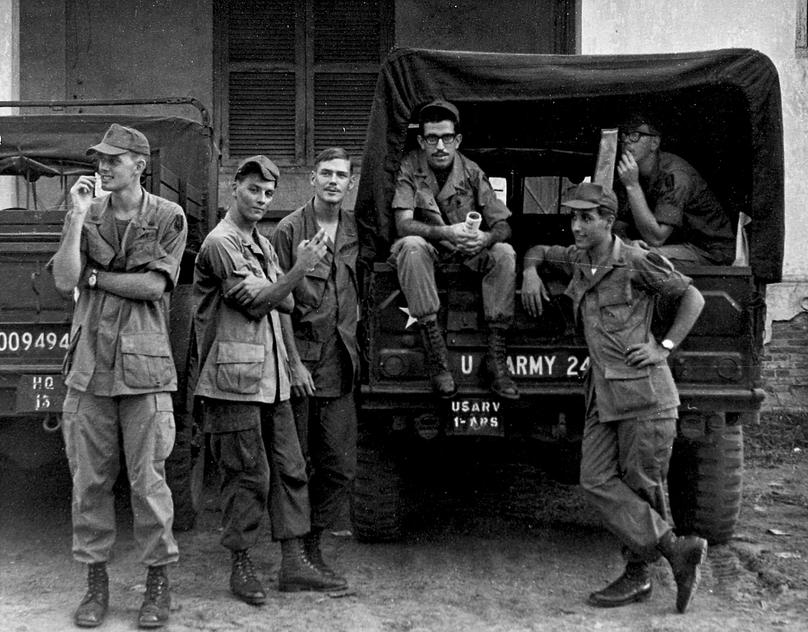The views expressed in our content reflect individual perspectives and do not represent the authoritative views of the Baha'i Faith.
Man’s speech is the revealer of his heart. In whatever world the heart travels, man’s conversation will revolve around that center. From his words you can understand in what world he is travelling, whether he is looking upward toward the realm of light or downward to the nether world, whether he is mindful or unaware, whether he is awake or asleep, whether he is alive or dead. – Abdu’l-Baha, Star of the West, Vol. VIII, No. 2, pp. 24-25.
Have you ever said anything you immediately wanted to take back?
I sure have–several things, actually.
In fact, my family still tells a cringe-worthy story about the day I came home from the war. Twenty-one years old, and in combat for fourteen months straight, I returned pretty traumatized. You’ve heard of traumatic brain injury? Luckily I avoided that, but instead I think the Army and the war gave me traumatic speech injury.
You can probably picture it: the prodigal son (I’m the oldest of five kids) just back from the war, sitting down to a celebratory turkey dinner with the whole family. It was July, but this was our Thanksgiving meal, all of us giving thanks that I had survived.
And if you’ve ever had it, you probably also remember Army chow–which means you understand how much I looked forward to this home-cooked homecoming meal my wonderful mother had prepared with love.
I’ll never forget how delicious that meal tasted. Every bite filled my senses with warmth. I breathed in the savory, luscious smells of the herbs in the stuffing and the delectable seasonings and the yeasty soft rolls and the aroma of the melting butter and the cranberries and the fresh vegetables, and I knew I was home and free and alive.
So I ate with gusto. After a few second helpings and some pumpkin pie, yum, I pushed back from the table and said, with gratitude, “Mom, that was a ________________ of a meal.”
Since this is a Baha’i website, you’ll need to fill in the blank space yourself—but I can tell you that the common Army curse word I uttered in front of my entire family made my parents blanch and my younger brothers and sisters burst out in stunned, nervous laughter, after their initial shock wore off.
I didn’t even understand their reaction, at first. I thought “What? Did I say something wrong?” Then it dawned on me—the coarse, obscenity-laced wartime speech I had unconsciously picked up and incorporated into my vocabulary during my tour in Vietnam just wouldn’t cut it on the homefront.
So I quickly and ashamedly apologized. My family, bless their hearts, seemed to shrug it off and forgive me. Certainly my father, a former Marine, understood. To this day, though, I realize that with one curse I probably transmitted some of my soul’s own violent wartime injury to those I loved. I still wish I could take it back. My words, I understood at that moment, had an impact on others.
For the next couple of years, or maybe decades, I fought one of the many battles soldiers fight when they come back to civilized life—I tried to civilize my speech. Once you’ve picked up the habit, that’s not easy to do.
Violence begets more violence—everyone knows that—but violence also causes a general coarsening of our humanity. The institutionalized violence of war breeds not just violent actions, but violent thoughts and violent speech. Abusive, insulting, injurious, offensive, profane and graphically obscene, wartime speech becomes normative and accepted in the violent environment of combat. During the war I heard the worst obscenities repeated constantly in everyone’s speech, from privates to generals, and I knew several soldiers who literally could not speak without using them, almost like punctuation or some kind of repetitive voluntary Tourette’s Syndrome. In a meeting during the war, one sergeant I knew spoke for twenty minutes, and used an F-bomb in literally every sentence he uttered.
Of course, war has no monopoly on obscene or violent speech. Any place that routinely diminishes and devalues human beings–prisons, labor camps and jails, for example—tends to do the same de-humanizing thing to what we do, and ultimately to what we say.
When that occurs, the verbal violence of war and prison inevitably return into the culture. Just like I returned from the war in Vietnam, the brutalized and traumatized soldiers and ex-convicts who try to re-integrate into their societies inevitably bring their trauma, their language, their attitudes and their verbal violence with them, and sometimes transmit it to their spouses, their partners and their children.
Many of the world’s cultures today have descended into a spiral of verbal violence. War and conflict represent one cause of that descent; but other factors play a part, too. In much of Western society, even our artistic and creative endeavors like films, music and literature have adopted a rash of harsh, coarse and obscene language, not only to depict how people talk “in real life,” but seemingly as a way to prove something. This coarsening of our language, along with other kinds of verbal violence, hurts us all.
The results–verbal abuse, bullying, backbiting, gossip, slander and even hate speech–have extremely negative, long-lasting effects on the people they target.
The Baha’i teachings have a great deal to say about the refinement and ultimate purpose of human speech, so in this series of essays we’ll examine the impact our words can have, explore the differences between verbal violence and kindness, and discuss how to guard against offending or injuring others with what we say.

















Comments
Sign in or create an account
Continue with Googleor